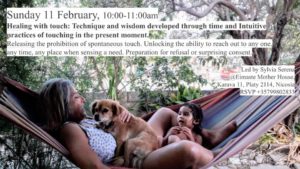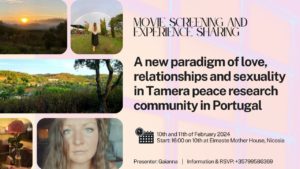Πιο κάτω στα Κυπριακά
The Star of Advent
Once upon a time, in a quiet village surrounded by snowy hills, lived a little girl named Eleni. It was the first day of December, and the villagers were busy decorating their homes for Christmas. Everyone in the village was excited, but Eleni felt restless.
“Why do we have to wait for Christmas to do something special?” she asked her grandmother, who was gently hanging a garland by the fireplace.
Her grandmother smiled and handed Eleni a small box tied with a silver ribbon. Inside was a wooden star, carved with tiny symbols that Eleni couldn’t understand. “This is your Advent Star,” her grandmother explained. “It will guide you as you prepare for Christmas. Each day, the star will glow a little brighter, but only if you fill it with acts of kindness and patience.”
Eleni tilted her head. “How does the star know what I do?”
“The star is magic,” her grandmother said mysteriously. “But magic only works if your heart is open.”
That evening, Eleni hung the star by her window. It looked plain, and no light came from it. “Maybe I need to do something kind tomorrow,” she thought.
The First Week of Advent
The next day, Eleni saw her neighbor, Mr. Pafos, struggling to carry firewood. She ran over to help him, even though the wood was heavy and the snow was cold. That night, as she stared at her star, a soft golden glow appeared in the center.
Excited, Eleni decided to keep going. Each day, she found little ways to help: she shoveled snow for a friend, baked cookies for her teacher, and even forgave her little brother when he broke her favorite ornament. Each night, her star glowed brighter, filling her room with a warm, golden light.
The Second Week of Advent
By the second week, the star’s light was bright enough to light up the whole window. People in the village began noticing its glow.
“What a beautiful star!” said her friend Theo. “Where did you get it?”
Eleni explained, and Theo decided to make his own Advent Star, promising to fill it with good deeds. Soon, others in the village began to do the same. Every window in the village started to twinkle with glowing stars.
The Third Week of Advent
One cold evening, Eleni saw an old traveler trudging through the snow. His coat was torn, and his face was pale from the cold. She ran inside, grabbed her warmest scarf, and gave it to him.
“Thank you, little one,” said the traveler, his eyes kind but tired. “Your light will guide many hearts.”
That night, when Eleni looked at her star, it was so bright it seemed to touch the sky. But something else had changed. The star now sparkled with tiny colors—blue, green, and red—like a rainbow. Her grandmother explained, “When your star shines so brightly, it helps others remember the spirit of Christmas: giving, forgiving, and love.”
The Fourth Week of Advent
As Christmas approached, the whole village had become a beacon of light. Each star, glowing with the kindness of the villagers, seemed to make the world outside the windows warmer and brighter, despite the snow.
On Christmas Eve, the village was alive with twinkling stars in every window, glowing softly against the snowy night. Eleni stood by her own window, admiring how brightly her star shone after a month of small but meaningful deeds. She thought of the moments that had filled it: helping her neighbor, baking cookies, forgiving her little brother, and giving her scarf to the traveler.
As she looked out, she noticed villagers gathering in the town square, holding their glowing stars. Her grandmother called her, and together they walked to join the others. When Eleni arrived, she was surprised to see the traveler standing among the crowd, smiling warmly. He held a star of his own, carved from wood and glowing just as brightly as hers.
“The kindness you showed me, little one, has traveled far,” he said. “I’ve shared your story with others, and now there are stars shining in villages beyond this one. Your light has spread farther than you can imagine.”
The villagers began singing carols, their voices rising into the cold night air. Eleni felt her heart fill with warmth—not from the star, but from the joy of being together.
As the singing ended, Eleni stepped forward. “This star has taught me that kindness can brighten even the darkest nights,” she said, her voice clear and confident, and with that, she climbed the tallest tree in the square and hung her star on its highest branch. Its golden glow illuminated the faces of the villagers, who cheered and clapped.
Eleni’s grandmother placed a hand on her shoulder. “You’ve given something special to this village, Eleni. And to the world.”
From that year on, the village gathered every Advent to light their stars together. The light grew brighter each year, spreading hope and kindness to everyone it touched.
Το Άστρον της Αντιλαμπής
Μια φορά τζιαι έναν τζαιρόν, σε έναν χωρκόν που ήταν περικυκλωμένον που χιονισμένες βουνοπλαγιές, εζούσεν μια μιτσιά, η Ελένη. Ήταν η πρώτη του Δεκέμβρη τζιαι ούλλοι οι χωρκάτες εκάμναν τες ετοιμασίες τους για τα Χριστούγεννα. Ο κόσμος έβαλλεν στολίθκια, εκρέμμαν λαμπάκια, τζιαι εστολίζαν τα σπίθκια τους. Αλλά η Ελένη ένιωθεν μια ανησυχία.
«Γιατί πρέπει να καρτερούμεν ως τα Χριστούγεννα για να κάμουμεν κάτι ξεχωριστό;» ερώτησεν την γιαγιά της, που εστόλιζεν μιαν γιρλάνταν κοντά στο τζάκι.
Η γιαγιά της εχαμογέλασεν τζι’ εδίαν της ένα μικρόν κουτίν δεμένον με ασημένια κορδέλλα. Μέσα ήταν ένα ξύλινο άστρο, σκαλισμένον με μιτσία-μιτσία σύμβολα που η Ελένη εν τα εκαταλάβαινεν.
«Τούτον εν το Άστρο της Αντιλαμπής σου», της εξήγησεν η γιαγιά της. «Εννά σε βοηθήσει να ετοιμαστείς για τα Χριστούγεννα. Κάθε μέρα, το άστρο εννά φωτίζεται λλίον παραπάνω, αλλά μόνον αν γεμίσεις τες μέρες σου με πράξεις καλοσύνης τζιαι υπομονής.»
Η Ελένη έγυρεν το κεφάλι της πλάγια. «Πώς ξέρει το άστρο τι κάμνω;»
«Το άστρο εν μαγικό», είπε μυστηριωδώς η γιαγιά της. «Αλλά η μαγεία δουλεύκει μόνον αν η καρδιά σου εν ανοιχτή.»
Εκείνην τη νύχτα, η Ελένη έβαλεν το άστρο της στο παραθύρι της. Εφαίνετουν σαν έναν απλόν στολίδιν, χωρίς ιδιαίτερην λάμψην. «Ίσως να χρειαστεί να κάμω κάτι καλόν αύριο», εσκέφτηκεν.
Η Πρώτη Εβδομάδα της Αντιλαμπής
Την επόμενη μέρα, η Ελένη είδεν τον γείτονα της, τον κύριο Παφίτη, να δυσκολεύκεται να κουβαλήσει ξύλα για το τζάκι του. Επήεν να του τανίσει, παρόλο που τα ξύλα ήταν βαρετά τζιαι το χιόνι ήταν παγωμένο. Την ίδια νύχτα, καθώς έβλεπεν το άστρο της, μια απαλή χρυσαφένια λάμψη εμφανίστηκεν στο κέντρο.
Ενθουσιασμένη, η Ελένη αποφάσισεν να συνεχίσει. Κάθε μέρα, έβρισκεν μικρούς τρόπους να βοηθά: εσκούπισεν το χιόνι για έναν φίλο, έψησεν κουλουρούθκια για τη δασκάλα της, τζιαι ακόμα τζιαι τον αδερφό της όταν της έσπασεν το αγαπημένο της παιχνίδι εν τον εμάλλωσεν. Κάθε νύχτα, το άστρο της έλαμπεν όλο τζι’ παραπάνω, γεμίζοντας το δωμάτιό της με μια ζεστή, χρυσαφένια λάμψη.
Η Δεύτερη Εβδομάδα της Αντιλαμπής
Ως τη δεύτερην εβδομάδα, το φως του άστρου ήταν τόσο δυνατόν που έφτασεν να φωτίζει ολόκληρο το παραθύρι της. Οι χωρκάτες άρχισαν να παρατηρούν τη λάμψη.
«Μα τι όμορφον άστρον!» είπε ο φίλος της, ο Θεόδωρος. «Πού το ήβρες;»
Η Ελένη του εξήγησεν, τζιαι ο Θεόδωρος αποφάσισεν να κάμει το δικό του Άστρο της Αντιλαμπής, τάσσοντας να το γεμίσει με καλές πράξεις. Σιγά-σιγά, τζι’ άλλοι χωρκάτες εκάμαν το ίδιο. Σε λλίες μέρες, ούλλα τα παραθύρκα του χωρκού άρχισαν να τρεμοσβήνουν με φωτεινά άστρα.
Η Τρίτη Εβδομάδα της Αντιλαμπής
Ένα παγωμένο βράδυ, η Ελένη είδεν έναν ηλικιωμένον ταξιδιώτη να περπατά στο χιόνι. Το παλτόν του ήταν σχισμένον, τζιαι το πρόσωπό του ήταν χλωμόν που το κρύο. Έτρεξεν μέσα, επήρεν τη πιο ζεστή της σιάρπα, τζιαι του την έδωκεν.
«Ευκαριστώ σε μιτσιά μου», της είπε ο ταξιδιώτης, με μάθκια γεμάτα καλοσύνη αλλά τζιαι κούραση. «Το φως σου εννά οδηγήσει πολλές καρδιές.»
Την ίδια νύχτα, το άστρο της Ελένης εν εφώτιζεν μόνο χρυσάφι, αλλά εσπίθισεν τζιαι μιτσές χρωματιστές λάμψεις—μπλε, πράσινο τζιαι κόκκινο—σαν ουράνιο τόξο.
Η Τέταρτη Εβδομάδα της Αντιλαμπής
Σαν εζύγωνναν τα Χριστούγεννα, το χωρκόν ούλον τζαι παραπάνω έλαμπεν σαν φάρος φωτός. Κάθε άστρον, που ελάμπεν με την προσφοράν τζαι αλληλοβοήθειαν των χωρκατών, έκαμνεν τον κόσμον μεσα που τα παραθύρκα να φαίνεται πιο φωτεινός ακόμα τζαι που το σιώνιν.
Την Παραμονήν των Χριστουγέννων, το χωρκόν ήταν γεμάτον ζωήν. Η Ελένη εστέκετουν στο παραθύριν της, θαυμάζοντας πόσον όμορφα έλαμπεν το άστρο της μετά που έναν μήνα γεμάτον μιτσιές μιτσιές όμορφες πράξεις καλοσύνης τζαι αλληλοβοήθειας. Εσκέφτετουν μιαν μιαν τες στιγμές που το εγεμίσασιν τζαι τις γλυκές πράξεις των γειτόνων της που είχαν γεμίσει τα δικά τους.
Καθώς έβλεπεν έξω, παρατήρησεν τους χωρκανούς να μαζεύκουνται στην πλατεία, κρατώντας τα άστρα τους. Εφώναξεν την η γιαγιά της τζιαι μαζί επερπατήσαν τζαι ενωθήκαν με τους υπόλοιπους. Σαν εφτάσαν, η Ελένη εξεπλάγηκεν να δει τον ταξιδιώτη να στέκεται μεσα στο πλήθος, χαμογελώντας θερμά. Εκρατούσεν έναν άστρο δικόν του, σκαλισμένον που ξύλον, που ελάμπεν όπως το δικό της.
«Η καλοσύνη που μου έδειξες, μιτσιά μου, έφτασεν μακριά», της είπε. «Εμοιράστηκα την ιστορία σου με άλλους, τζιαι τωρά υπάρχουν άστρα που λάμπουν σε χωρκά πιο πέρα που τούτον. Το φως σου εξεκίνησε έναν ταξίδιν πιο μεάλον απ’ ό,τι μπορείς να φανταστείς.»
Οι χωρκανοί αρχίσαν να τραγουδούν κάλαντα τζαι οι φωνές τους ανεβαίναν μες στον παγωμένον νυχτερινόν αέρα. Η Ελένη ένιωσε την καρδιά της να γεμίζει ζεστασιά—όι που το άστρο, αλλά που τη χαρά που ήταν μαζί με τους άλλους.
Όταν τα τραγούδια εσταματήσαν, η Ελένη επροχώρησεν μπροστά. «Τούτο το άστρο μου έμαθεν ότι η καλοσύνη μπορεί να φωτίσει ακόμα τζιαι τες πιο σκοτεινές νύχτες», είπεν με φωνή καθαρή τζαι δυνατή. Τζαι εσκαρφάλωσεν το πιο ψηλό δέντρο στην πλατεία τζιαι εστερέωσεν το άστρο της στο πιο ψηλό κλωνίν. Η χρυσή του λάμψη εφώτισεν τα πρόσωπα των χωρκατών με χαράν τζαι περηφάνειαν.
Η γιαγιά της έβαλεν το σιέριν της στον ώμο της. «Έδωκες κάτι πολύτιμον σε τούτο το χωρκόν, Ελένη. Τζιαι στον κόσμο ούλλον.»
Που τζείνη τη χρονιά τζιαι μετά, ούλλο το χωρκόν εμαζεύκετουν κάθε Αντιλαμπή για να ανάψουν μαζί τα άστρα τους. Το φως εγίνετουν κάθε χρόνο πιο λαμπρόν, σκορπώντας ελπίδαν τζιαι καλοσύνην σε ούλλους που εσυναντούσεν.












